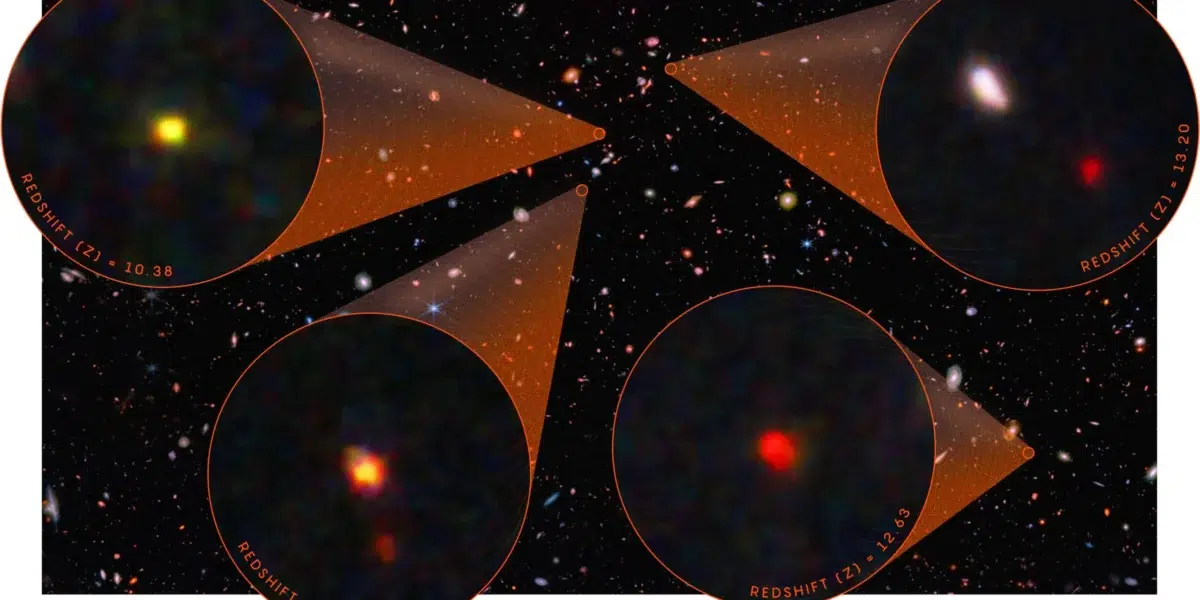Astronomers using the James Webb Space Telescope (JWST) have uncovered data that challenges the prevailing Lambda-Cold Dark Matter (Lambda-CDM) model, which relies on dark matter to explain the formation and structure of the universe.
Instead, the findings lend support to an alternate theory of gravity known as Modified Newtonian Dynamics (MOND), which could reshape long-held cosmological assumptions.
The study, led by researchers from Case Western Reserve University, examined ancient galaxies at the universe’s earliest stages. The observations contradict Lambda-CDM’s predictions that galaxies would appear small and dim, gradually forming under the influence of dark matter. Instead, these galaxies appear large, bright, and fully formed, aligning more closely with MOND’s framework.
Read More: PTA suspends mobile, internet services in some areas of Balochistan
New look at Galactic formation
Lambda-CDM has been the dominant cosmological model, positing that dark matter—a mysterious, unseen substance—provides the gravitational pull necessary to shape galaxies and large-scale structures. However, data from JWST is casting doubt on this theory.
Stacy McGaugh, a professor of astronomy at Case Western Reserve, emphasised the discrepancy:
“What the theory of dark matter predicted is not what we see,” McGaugh said. According to him, the Lambda-CDM model suggests that the gravitational pull from dark matter should have slowly accreted galactic material over time. Yet JWST’s observations reveal galaxies forming far earlier and more completely than anticipated.
MOND, proposed in 1983 by Israeli physicist Mordehai Milgrom, offers a radically different explanation. By modifying Newton’s second law of motion in low-acceleration environments, MOND eliminates the need for dark matter. Instead, it posits that galaxies and structures form rapidly under a different gravitational paradigm.
McGaugh, who co-authored a seminal 1998 paper on the subject, pointed to JWST’s data as validation for MOND’s predictions. “The expectation was that every big galaxy we see in the nearby universe would have started from these itty-bitty pieces,” he said. “That’s not what JWST is showing us.”
Evidence sparks renewed debate
The study highlights MOND’s accuracy in predicting the structure and brightness of ancient galaxies, contrasting sharply with Lambda-CDM models. For instance, predictions made by MOND proponent R. H. Sanders more closely match James Webb Telescope observations than those from Lambda-CDM advocates, McGaugh argued.
Despite these successes, MOND remains contentious due to its challenges in aligning with Einstein’s Theory of General Relativity, a cornerstone of modern physics. Critics also note that Lambda-CDM has provided robust explanations for the universe’s expansion, the cosmic microwave background, and large-scale structure formation.
“Facts inconsistent with a model don’t necessarily mean abandoning it,” McGaugh conceded. “But repeated failures to match observational data suggest the need for a more comprehensive framework.”
The broader astrophysical community remains cautious, with many researchers advocating for further analysis of JWST data. Lambda-CDM, while imperfect, continues to provide a cohesive framework for understanding the universe, they argue.
Scientific method in action
As the debate unfolds, McGaugh sees the findings as a vindication of the scientific process. “The whole point of the scientific method is to make predictions and check which come true,” he said, adding wryly, “The bottom line is, ‘I told you so.’”
The study, titled Accelerated Structure Formation: The Early Emergence of Massive Galaxies and Clusters of Galaxies, was published in The Astrophysical Journal on November 12, 2024.
Whether MOND will gain wider acceptance or face further scrutiny, the discoveries from JWST underscore the dynamic and evolving nature of our understanding of the cosmos.









![Lahore launches green transport system with electric buses [Images]](https://azaadenglish.com/wp-content/uploads/2024/12/Lahore-launches-green-transport-AzaadEnglish.jpeg)






